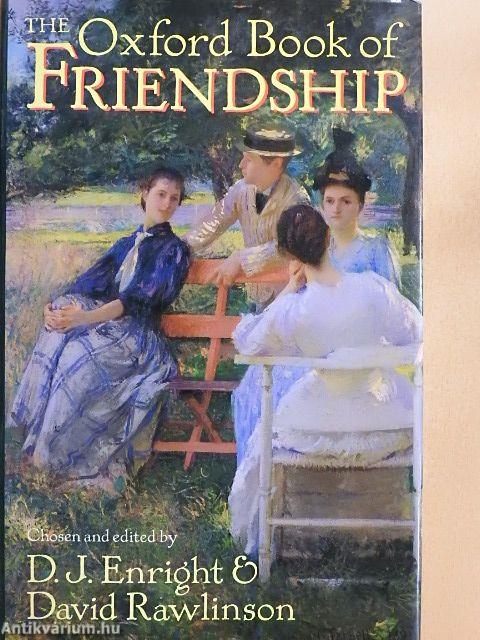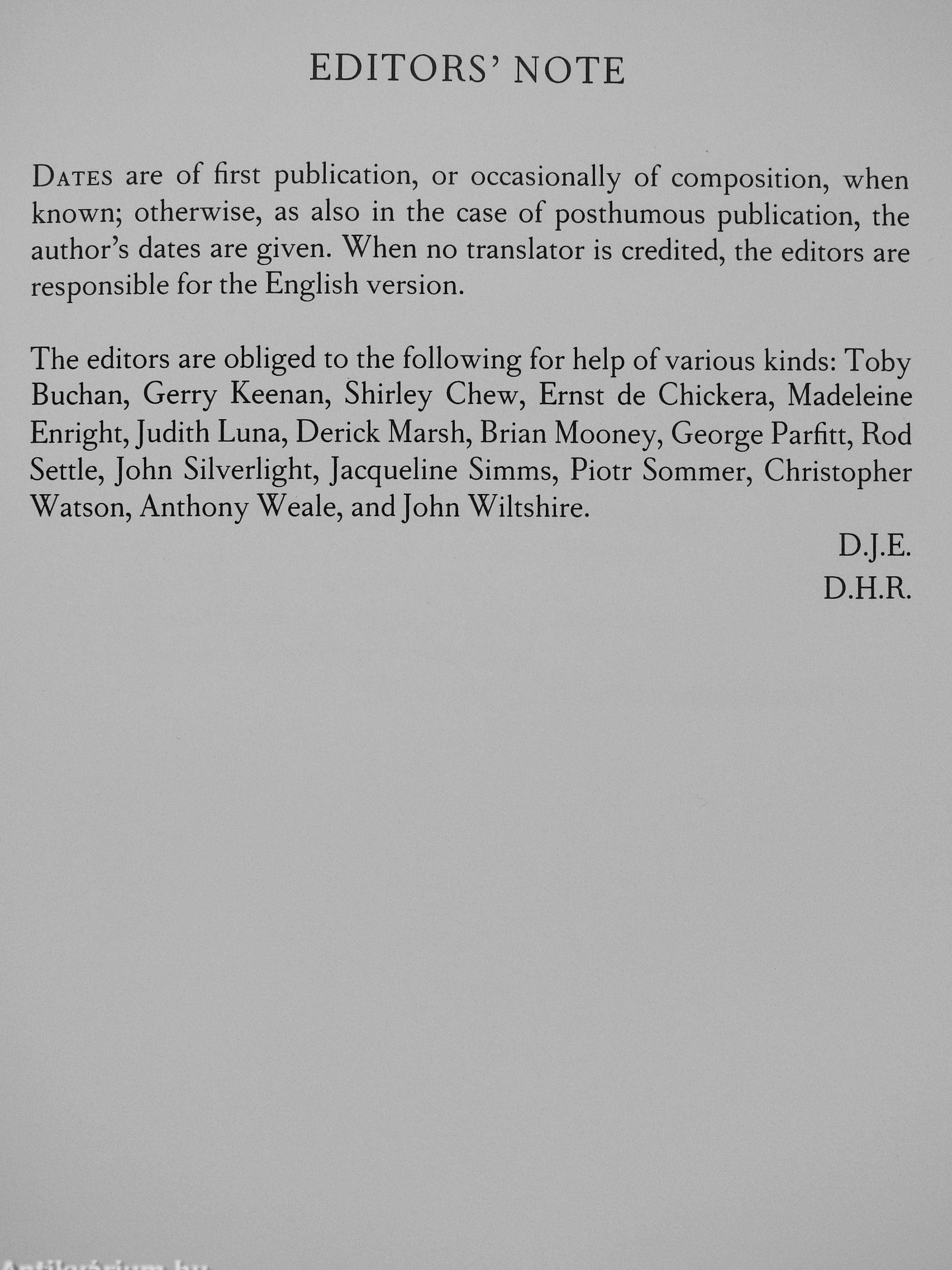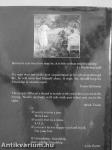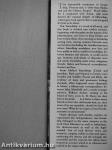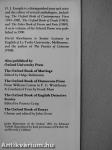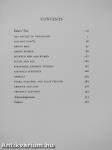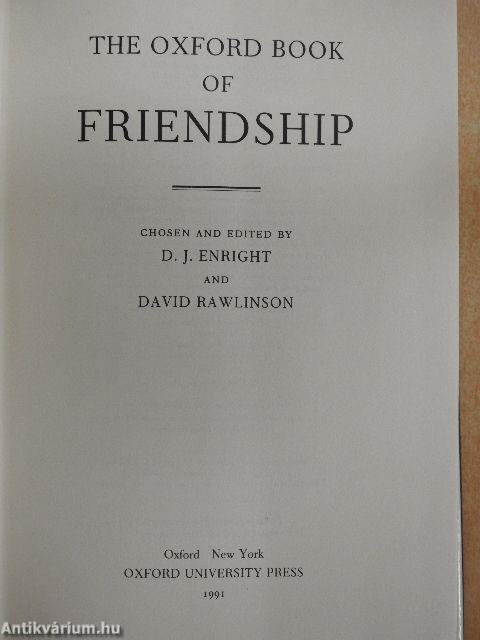1.067.327
kiadvánnyal nyújtjuk Magyarország legnagyobb antikvár könyv-kínálatát

VISSZA
A TETEJÉRE
JAVASLATOKÉszre-
vételek
The Oxford Book of Friendship
| Kiadó: | Oxford University Press |
|---|---|
| Kiadás helye: | Oxford-New York |
| Kiadás éve: | |
| Kötés típusa: | Fűzött keménykötés |
| Oldalszám: | 364 oldal |
| Sorozatcím: | |
| Kötetszám: | |
| Nyelv: | Angol |
| Méret: | 22 cm x 15 cm |
| ISBN: | 0-19-214190-2 |
naponta értesítjük a beérkező friss
kiadványokról
naponta értesítjük a beérkező friss
kiadványokról
Előszó
TovábbFülszöveg
However tare true love may be, it is less so than true friendship.
La Rochefoucauld
If a man does not make new acquaintance as he advances through life, he will soon find himself alone. A man, Sir, should keep his friendship in constant repair. V
Samuel Johnson
The proper office of a friend is to side with you when you are in the wrong. Nearly anybody will side with you when you are in the right.
JVlark Twain
If you're ever in a jam.
Here I am. If you're ever in a mess,
S.O.S. _ _ _ ¦
If you ever feel so Iiappy you land in jail, I'm your bail.
It's friendship, friendship, Just a perfect blendship . . .
Cole Porter
'"T^he honourable institution of friend-X ship, Thoreau said, is 'older than Hindostán and the Chinese Empire'. Much older, for it originated with Adam, who soon desired the 'rational delight' of fellowship, whereupon God agreed that it was not good for him to be alone.
But 'friendship' is a word of all work, and this book is divided into twelve sections,... Tovább
Fülszöveg
However tare true love may be, it is less so than true friendship.
La Rochefoucauld
If a man does not make new acquaintance as he advances through life, he will soon find himself alone. A man, Sir, should keep his friendship in constant repair. V
Samuel Johnson
The proper office of a friend is to side with you when you are in the wrong. Nearly anybody will side with you when you are in the right.
JVlark Twain
If you're ever in a jam.
Here I am. If you're ever in a mess,
S.O.S. _ _ _ ¦
If you ever feel so Iiappy you land in jail, I'm your bail.
It's friendship, friendship, Just a perfect blendship . . .
Cole Porter
'"T^he honourable institution of friend-X ship, Thoreau said, is 'older than Hindostán and the Chinese Empire'. Much older, for it originated with Adam, who soon desired the 'rational delight' of fellowship, whereupon God agreed that it was not good for him to be alone.
But 'friendship' is a word of all work, and this book is divided into twelve sections, beginning with thoughts on the nature of the phenomenon, and how to keep friends and how to lose them, then moving to friendship among men, among women, between men and women (including the troubled territory where friendship modulates into love and love yields or fails to yield to friendship), between humans and animals, in youth and in age, between individuals of disparate races and creeds, friendship under stress, imaginary friends, failure and betrayal, reconciliation, absence and loss.
From biblical friendships (David and Jonathan, Ruth and Naomi) to literary ones (Goethe and Schiller, Pound and Eliot), the evidence of deep and passionate feelings abounds, often expressed most eloquently in letters: a fifteen-year correspondence between John Masefield and a much younger admirer; William Archer, writing to his friend of forty years G. B. Shaw, ten days before his death Is it better to have many friends or few? Are old friends best, or, since some of us are cannibals, should we look for new ones? What do we expect of our friends, assistance or amusement?
Hopes alternate with doubts, sceptics are represented (for Schopenhauer, true friendship belonged to the same category as the Loch Ness Monster) as well as enthusiasts, the down-to-earth as well as the high-minded. Out of such diverse views and instances, ranging widely in time and space, embracing the intense and the tranquil, the sorrowful and the comical, the editors have framed an account which is as coherent and unified as the subject allows.
D.J. Enright is a distinguished poet and critic and the editor of several anthologies, including The Oxford Book of Contemporary Verse 1945-1980, The Oxford Book of Death (1983), and The Faber Book of Fevers and Frets (1989). A new volume of his Selected Poems was published in 1990.
David Rawlinson is Senior Lecturer in English at La Trobe LJniversity, Melbourne, and the author of The Practice of Criticism (1968).
Also published by Oxford University Press
The Oxford Book of Marriage Edited by Helge Rubinstein
The Oxford Book of Humorous Prose From William Caxton to P. G. Wodehouse A Conducted Tour by Frank Muir
The Oxford Book of English Detective Stories
Edited by Patricia Craig
The Oxford Book of Essays Chosen and edited by John Gross
Jacket illustration: In the Orchard, 1891, by Edmund Tarbell. Reproduced by kind permission of Herbert IVl. and Beverly J. Gelfand
;jjá Vissza
Témakörök
- Idegennyelv > Idegennyelvű könyvek > Angol > Szépirodalom > Antológia
- Idegennyelv > Idegennyelvű könyvek > Angol > Szépirodalom > Regény, novella, elbeszélés
- Szépirodalom > Regény, novella, elbeszélés > Tartalom szerint > Lélektani regények
- Szépirodalom > Regény, novella, elbeszélés > Tartalom szerint > Összegyűjtött novellák
- Szépirodalom > Antológia



